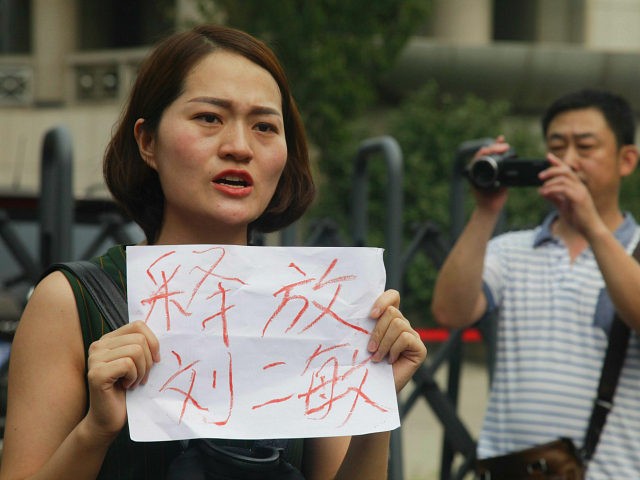Li Wenzu’s sixty-mile march to demand answers about the fate of her imprisoned husband Wang Quanzhang was cut short on Tuesday, as she was scooped up by plainclothes police and deposited back at her home under house arrest.
Meanwhile, China once again postponed discussions to allow Liu Xia, wife of the late dissident and Nobel laureate Liu Xiaobo, to emigrate to a free country. Liu Xia has effectively been under house arrest for eight years and counting.
Reuters describes the scene as China’s tyrants deciding Li Wenzu could be allowed to walk no further into the city of Tianjin, where her husband has either been held incommunicado for over 1,000 days or buried in an unmarked grave:
Video images sent to Reuters by Li’s supporters showed a hectic scene on Wednesday, with some plainclothes men swearing at Li’s friends and trying to block them from filming a gathering of about 30 people in the road outside her flat.
“My husband has been held for over 1,000 days and I don’t know if he’s even alive or dead. I went to find my husband – what have I done wrong?” Li shouts from behind the grille of her small balcony, in a clip taken from inside the flat.
A friend of Li’s said he tried to visit her at home but was blocked by state security officers.
“On April 11, 2018, trapped at home by 40 or 50 people. A friend who came to visit was stopped and beaten. I can only climb out the window to shout,” Li reported with her Twitter account on Wednesday. She also complained that her five-year-old son is terrified of the state security squad that has taken up residence in the apartment beneath hers.
“Xi Jinping always declares to the world that the Chinese government is ruling by law. What kind of law will (let) a country detain a human rights lawyer without any obvious reason?” asked Hong Kong lawmaker Kwok Ka-ki at a sympathy protest for Li and Wang he organized on Tuesday.
Liu Xia, whose husband Liu Xiaobo died in custody last July after the Chinese government refused to allow him to seek cancer treatment abroad, has been kept under close surveillance and denied permission to travel since his death. Her opportunities to speak with family and friends are infrequent and carefully monitored.
An unnamed Western diplomat told Reuters that Liu’s case has been handled “discreetly” thus far because it was widely assumed the Chinese government would eventually let her leave the country, but now there are “growing doubts that she will be released in the near future.”
“Chinese dissidents have in the past been allowed to leave the country and take up residence in a willing Western host nation,” Reuters explains. “However, since coming to power in 2013, Chinese President Xi Jinping has presided over a sweeping campaign to quash dissent throughout Chinese society, detaining hundreds of rights activists and lawyers; dozens have been jailed.”
Friends of Liu said the Chinese government is afraid of what Liu might say once she is free of their control, and also worry that she will demand the release of her brother Liu Hui, also currently under house arrest. Liu Xia is said to be in declining mental health, and heavily dependent on her brother. One friend of the family speculated that Beijing might let Liu go if it can keep her brother as a hostage to her good behavior.
On the other hand, Sophie Richardson of Human Rights Watch complained that international pressure has not been increased to the point where China feels obliged to treat Liu better.
“From Beijing’s perspective, there’s no place to go but down in releasing her,” Richardson explained. “It’s not a complicated diplomatic thing. It’s about making it more painful for Beijing to keep her than release her.”
Last week Liu was allowed to honor her husband in the first “grave-sweeping festival” since his death—but she had to do it from her home, under tight surveillance, because the government cremated him and scattered his ashes at sea, fearful that his grave could become a rallying point for dissidents.
Liu Xiaobo supporters across China found surreptitious ways to honor him during the grave-sweeping festival, usually involving beaches, to symbolize that the ocean became his grave. One clever memorial created the outline of an empty chair in the sand, a callback to the empty chair that infamously stood in for him in Oslo when the Chinese government would not allow him to accept his Nobel Peace Prize in person.

COMMENTS
Please let us know if you're having issues with commenting.